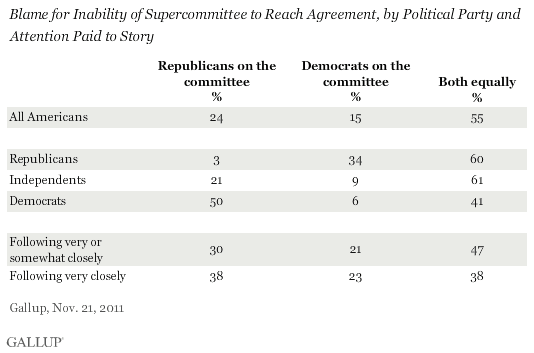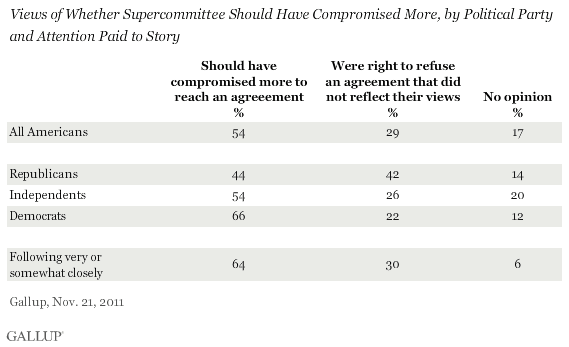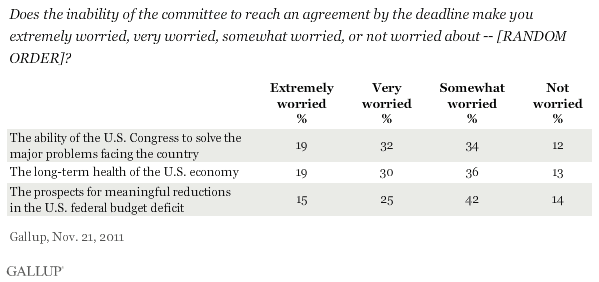PRINCETON, NJ -- A majority of Americans (55%) believe Republicans and Democrats on the U.S. debt "supercommittee" are equally to blame for its inability to reach an agreement. Those who blame lawmakers on one side more than those on the other are inclined to point the finger at Republicans on the committee rather than Democrats.
![Who do you blame more for the inability of the committee to reach an agreement -- [ROTATED: the Republicans on the committee, the Democrats on the committee,] or both equally? November 2011 results](http://content.gallup.com/origin/gallupinc/GallupSpaces/Production/Cms/POLL/xbrd5vglsui-a0t6etasha.gif)
These results are based on a Nov. 21 ÆéûÜǨû§poll, conducted after the committee of six Republicans and six Democrats conceded Monday afternoon it would not be able to reach an agreement by its Nov. 23 deadline. The supercommittee was created as part of the legislation to raise the federal debt limit in August. Because it did not reach an agreement, automatic cuts in defense and entitlement spending will be made in 2013, though Congress is considering its options for preventing those automatic cuts from being made.
A majority of Republicans and independents blame supercommittee members from both parties equally. In contrast, Democrats are most likely to blame Republicans for the failure to reach an agreement.
Additionally, the 53% of Americans who are following the story very or somewhat closely are also inclined to see both sides as equally to blame. However, the smaller subset of 20% of Americans following the story "very closely" is as likely to blame the Republicans on the committee as to blame both sides the same.

Americans Think Committee Should Have Compromised More
By a nearly 2-to-1 margin, 54% to 29%, Americans think the committee members should have compromised their views on taxes, spending, and the debt more in order to reach an agreement, as opposed to what they effectively did -- refusing to agree to a deal that did not reflect their beliefs on taxes, spending, and the debt.
The margin in favor of compromise is greater among those who are following the story very or somewhat closely.
But not all Americans endorse further compromising. Whereas Democrats and independents largely back further compromise, Republicans are divided in their views of whether the committee should have compromised more or was right to refuse to reach an agreement that strayed from their views on fiscal policy.

Americans Are Not Overly Worried About Future for Economy, Debt
Americans generally express some worry about the effect of the supercommittee's failure to reach an agreement on the prospects for meaningful deficit reduction, the health of the U.S. economy, and the ability of Congress to address the major problems facing the United States. In each of these areas, 40% to 51% of Americans express a high degree of worry, saying they are "extremely" or "very worried."
On a relative basis, Americans worry more about Congress' ability to address the nation's problems and less about the prospects for meaningful debt reduction. The lesser worry about the debt could indicate that Americans are aware that automatic spending cuts are scheduled to take place now that no agreement has been reached.

The level of worry about these matters is generally similar by political party. Those who are following the story closely express greater worry about all three, particularly with respect to Congress' ability to deal with the most pressing issues facing the United States (63% are extremely or very worried, compared with 35% among those not following the story closely and 51% of all Americans).
Implications
Congress gave the U.S. debt supercommittee great responsibility and great powers to craft a bipartisan plan to reduce the federal budget deficit. Ultimately, the supercommittee members could not stray far from their respective party's beliefs about taxes and economic redistribution and were unable to find enough common ground to reach an agreement.
Although the inability to reach an agreement does not reflect well on Congress as an institution, it is not clear that the failure will dramatically affect the way people view Congress.
First, the American public generally regards both parties' members as being at fault for the lack of an agreement, suggesting the political fallout may not come down much more heavily on one party than on the other.
Second, though Americans do express worry about the ability of Congress to get things done, the prospects for reducing the federal budget deficit, and the health of the U.S. economy, they do not appear overly worried about these things.
Third, despite the high level of news media coverage of the supercommittee in recent weeks, almost half of Americans say they are not following the story closely.
Last, Americans' and are already at historical lows, so hearing more news about Congress' inability to act cannot tarnish views of the institution much more.
Survey Methods
Results for this ÆéûÜǨû§poll are based on telephone interviews conducted Nov. 21, 2011, on the ÆéûÜǨû§Daily tracking survey, with a random sample of 1,001 adults, aged 18 and older, living in all 50 U.S. states and the District of Columbia.
For results based on the total sample of national adults, one can say with 95% confidence that the maximum margin of sampling error is ôÝ4 percentage points.
Interviews are conducted with respondents on landline telephones and cellular phones, with interviews conducted in Spanish for respondents who are primarily Spanish-speaking. Each sample includes a minimum quota of 400 cell phone respondents and 600 landline respondents per 1,000 national adults, with additional minimum quotas among landline respondents by region. Landline telephone numbers are chosen at random among listed telephone numbers. Cell phone numbers are selected using random-digit-dial methods. Landline respondents are chosen at random within each household on the basis of which member had the most recent birthday.
Samples are weighted by gender, age, race, Hispanic ethnicity, education, region, adults in the household, and phone status (cell phone only/landline only/both, cell phone mostly, and having an unlisted landline number). Demographic weighting targets are based on the March 2010 Current Population Survey figures for the aged 18 and older non-institutionalized population living in U.S. telephone households. All reported margins of sampling error include the computed design effects for weighting and sample design.
In addition to sampling error, question wording and practical difficulties in conducting surveys can introduce error or bias into the findings of public opinion polls.
Polls conducted entirely in one day, such as this one, are subject to additional error or bias not found in polls conducted over several days.
View methodology, full question results, and trend data.
For more details on Gallup's polling methodology, visit .
